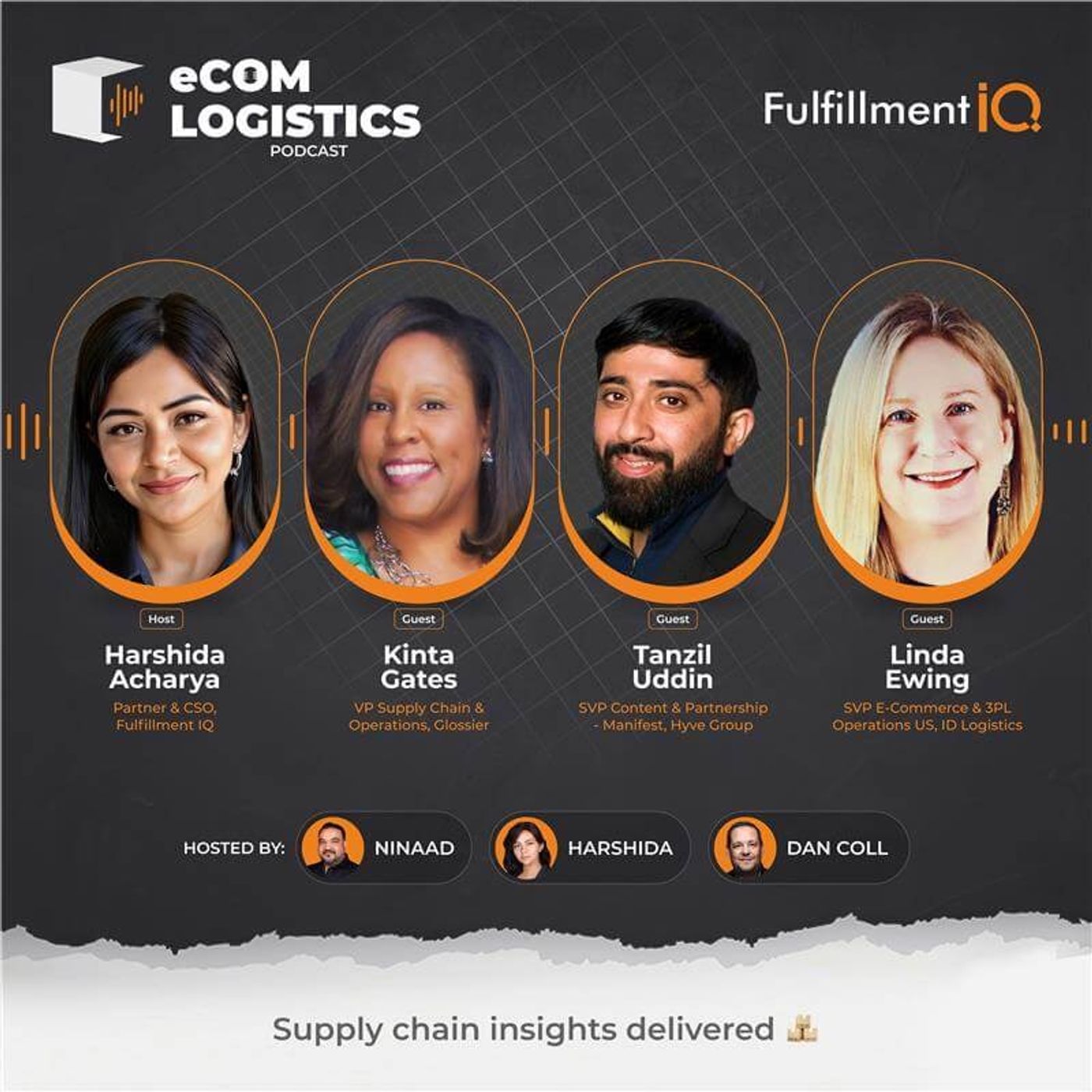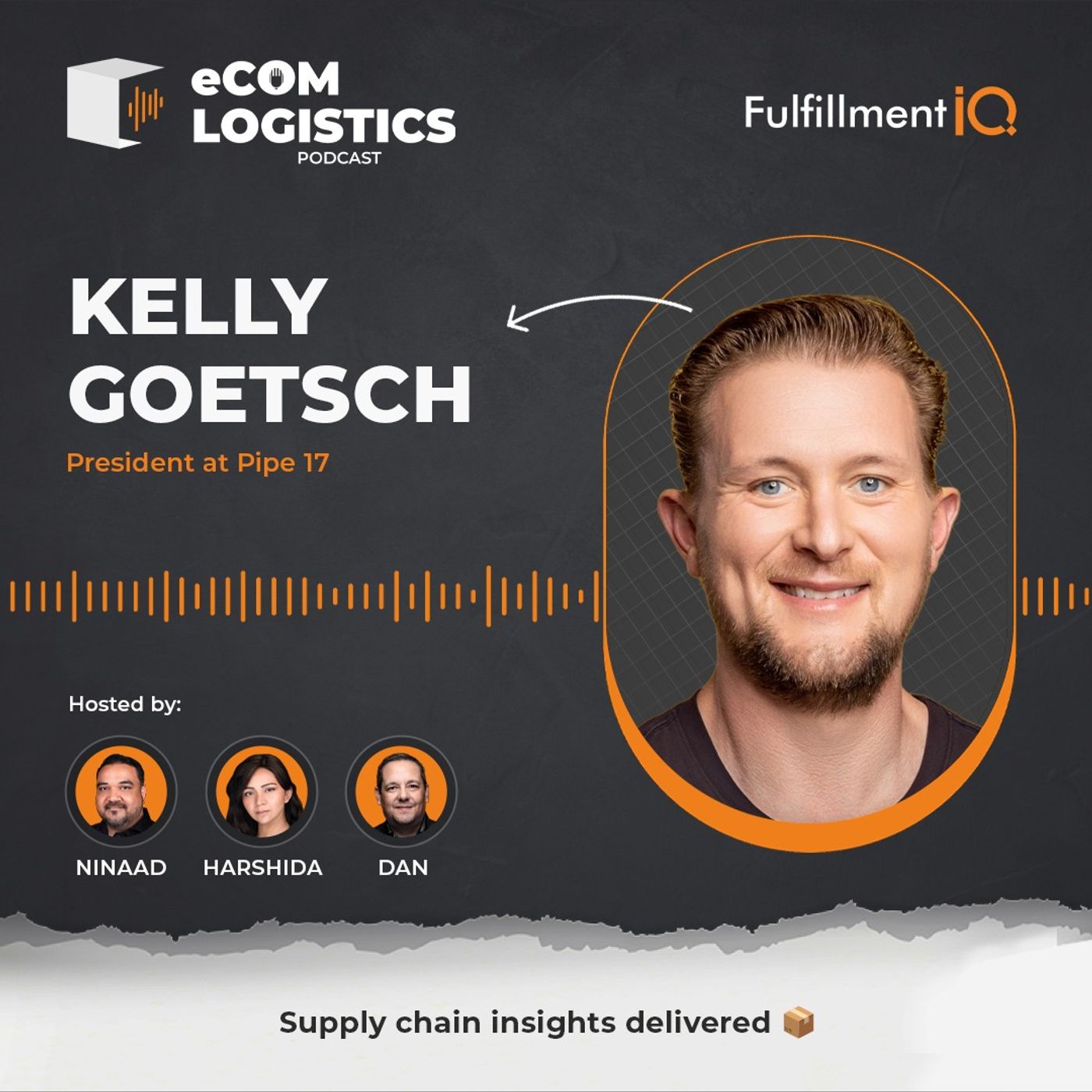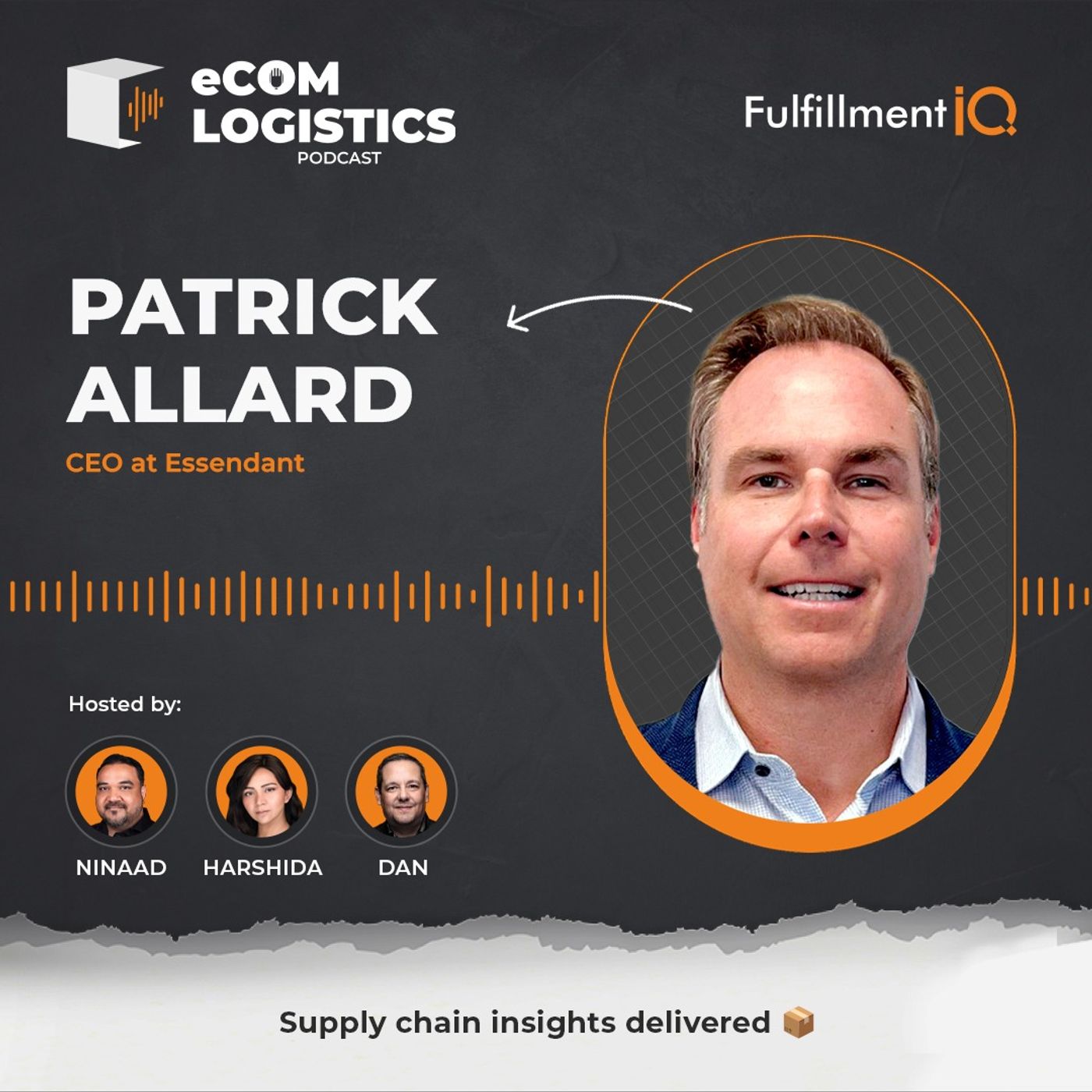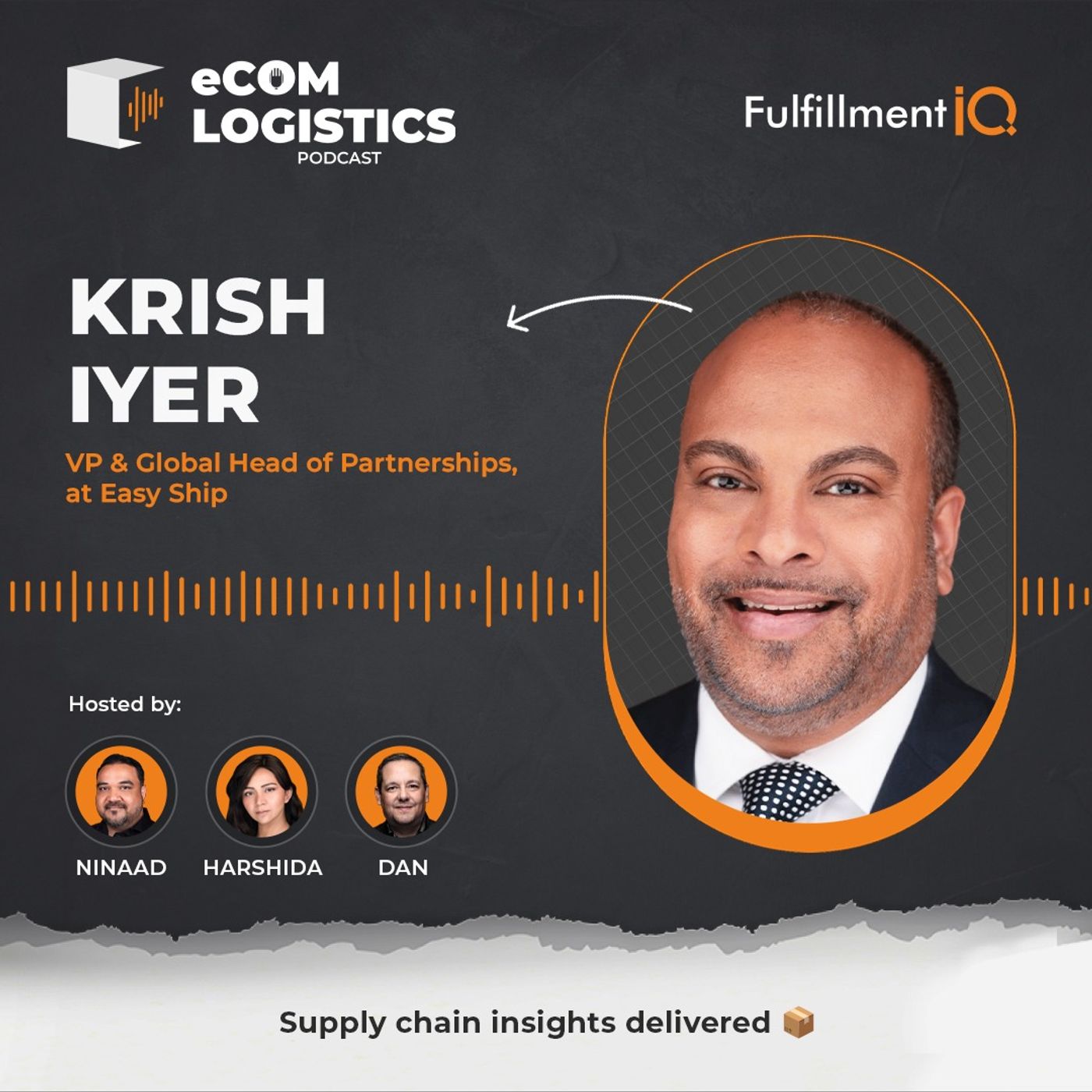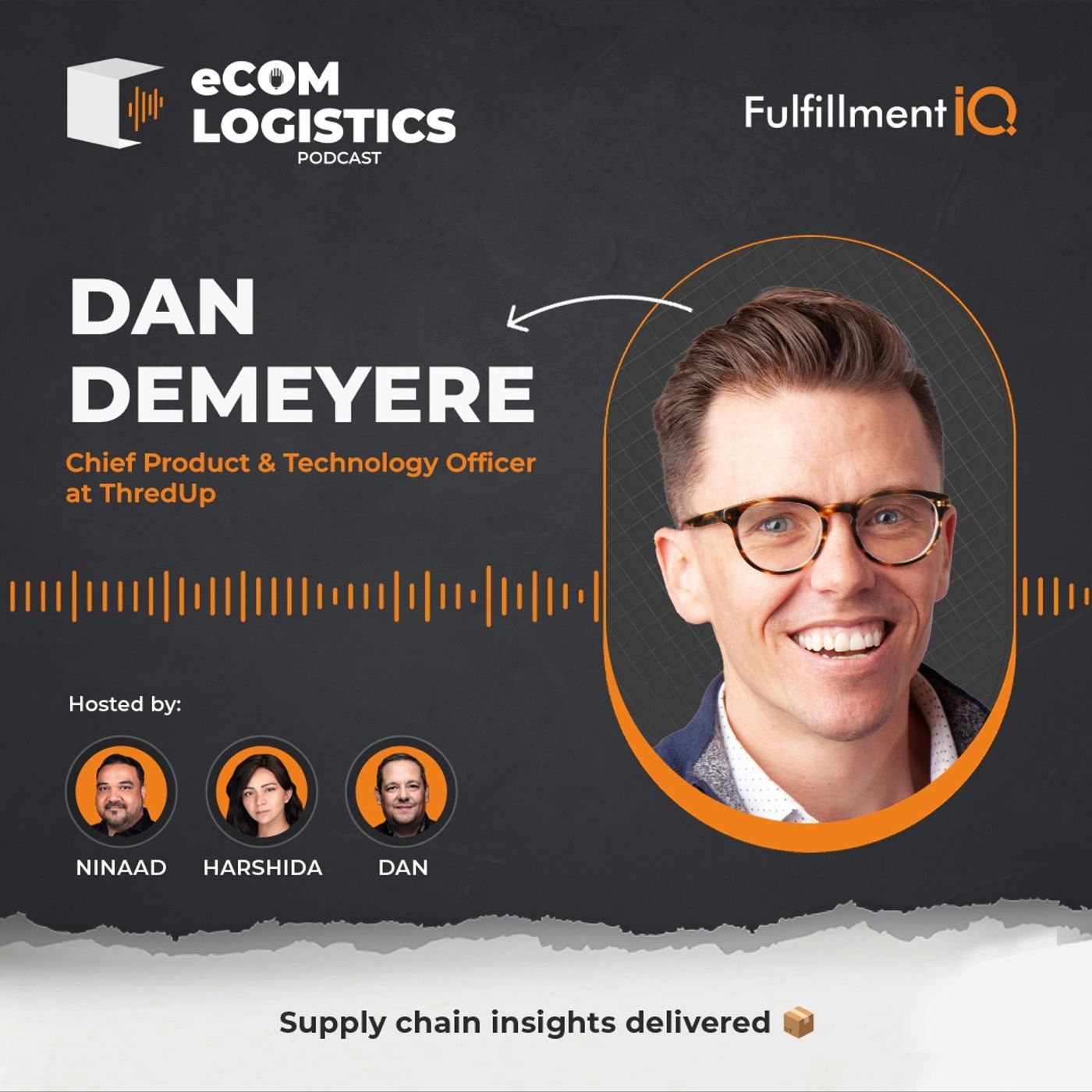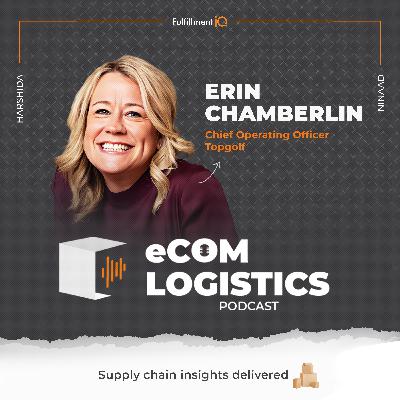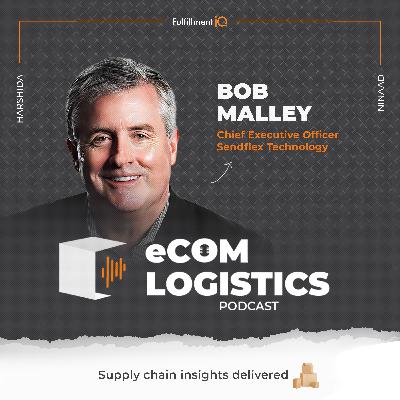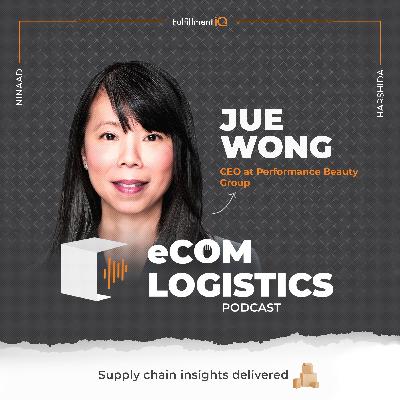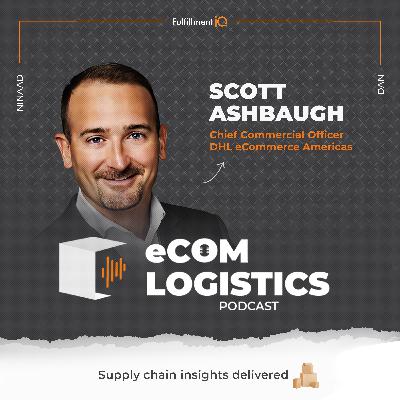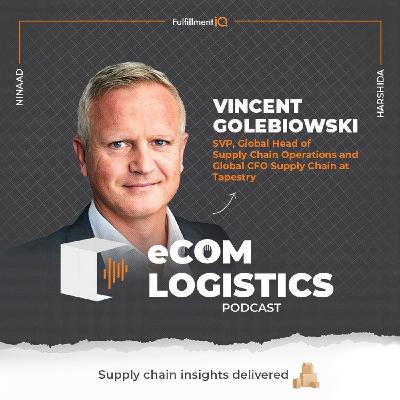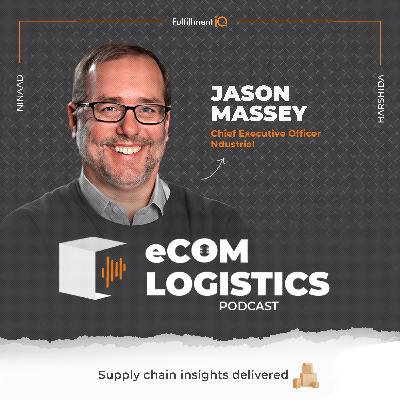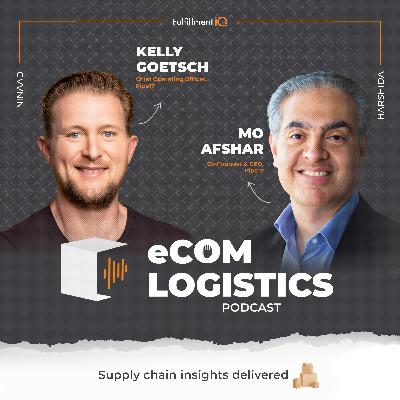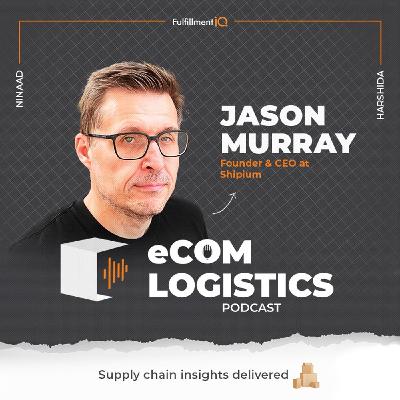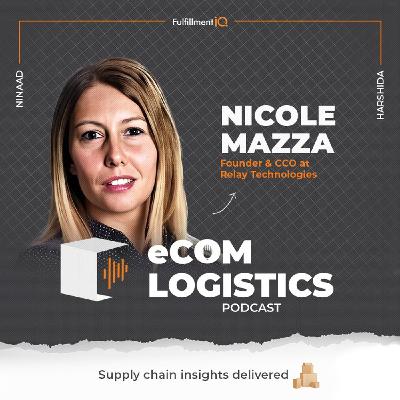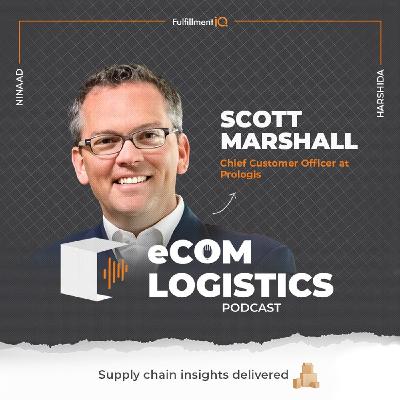Discover eCom Logistics Podcast
eCom Logistics Podcast

eCom Logistics Podcast
Author: Fulfillment IQ, Ninaad Acharya, Dan Coll
Subscribed: 16Played: 390Subscribe
Share
© Fulfillment IQ Original
Description
Get the inside perspective on how successful supply chain technology companies and e-commerce fulfillment providers win in today's competitive landscape. eCom Logistics Podcast gives you insights from the top leaders and experts to get you the answers to your most pressing supply chain issues.
117 Episodes
Reverse
WHAT YOU’LL LEARN Why decision quality matters more than perfect systems in today’s supply chainsHow leaders are shifting from growth-at-all-costs to margin-first thinkingWhat’s actually breaking inside warehouses amid labor churn and volatilityWhere AI is helping operators—and where hype still outpaces realityWhy explainability, KPIs, and guardrails matter for AI adoption in operationsHow leadership expectations are changing across supply chain organizationsWhat conversations operators are prioritizing heading into Manifest 2026HIGHLIGHTS00:00–02:35 | Why 2025 forced hard reflection across supply chain03:17–04:30 | Decisions feel heavier, mistakes cost more05:23–06:49 | The shift from growth to margin as a first principle07:05–07:43 | Why warehouse systems lag brand expectations08:08–08:58 | Recalibration after stacked volatility09:48–11:20 | Why peak season planning never really ends12:32–13:45 | Labor, churn, and execution pressure inside warehouses14:35–16:51 | AI as decision enablement—not the strategy itself18:14–21:43 | From AI fear to outcome-driven adoption22:23–25:44 | What leadership looks like in volatile environments26:47–28:16 | What leaders are watching heading into Manifest 2026QUOTES[00:03:17] “Decisions feel heavier. Mistakes are more expensive.” – Tanzil Uddin[00:05:45] “There’s a shift away from growth at all costs, really a repositioning of margin as a first principle.” – Kinta Gates[00:12:32] “The complexity with labor, training of the labor, churn of the labor, weather events, and the geopolitical state really impacts warehouse services.” – Linda Ewing[00:22:23] “Leadership looks like getting in the weeds. We don’t have the luxury of just delegating.” – Kinta GatesABOUT THE GUESTSTanzil UddinSVP of Content & Partnerships at Manifest, where he works closely with supply chain leaders to shape programming around real operator priorities, partnerships, and emerging challenges across logistics and technology.Kinta GatesVP of Supply Chain & Operations at Glossier, overseeing end-to-end product operations. Kinta brings a people-first, margin-aware approach to scaling fulfillment, manufacturing, and supply chain execution.Linda EwingSVP Strategy & Operations at ID Logistics with deep experience across manufacturing, supply chain, and warehouse services. Linda focuses on execution reality inside 3PL environments, labor challenges, and responsible technology adoption.LINKS MENTIONEDManifest 2026 Agenda: https://manife.st/agenda/💡 Planning to attend Manifest 2026? Use this exclusive link for $200 off the current registration price: https://partner.manife.st/partner/ecomlogistics
Subscribe and Keep Learning!If you’re a logistics leader looking to scale sustainably, don’t miss out! Subscribe for more expert strategies on tackling modern supply chain challenges.Be sure to follow and tag the eCom Logistics Podcast on LinkedIn and YouTube
What You’ll Learn- Why legacy commerce APIs and EDI no longer suffice in today’s fragmented commerce landscape- How AI and emerging protocols like MCP are accelerating the need for real-time fulfillment integration- The structure, tools, and resources defined by OnX for seamless order management across ecosystems- The nonprofit "business league" legal framework that keeps OnX vendor-agnostic and collaborative- The challenges commerce platforms face with OMS integrations and how OnX aims to reduce friction- The shift from platform-centric to protocol-centric commerce enabled by open standards- How industry players—brands, 3PLs, ERP, WMS, and commerce platforms—are rallying behind OnXHihghlights- 00:00 — Welcome, introduction to Kelly Goetsch and the focus: “Connected Commerce”- 02:00 — The fragmentation problem: marketplaces, social commerce, AI, and legacy EDI- 04:00 — The rise of MCP and Agentic Commerce Protocol as enablers for a new standard- 06:00 — Building a “big tent” network: OMS, 3PLs, WMSs, ERPs connectivity challenges- 10:00 — Commerce platform vs fulfillment backend: the tech and mindset divide- 14:00 — What is OnX? Tools, resources, member base, and the standard’s scope- 18:00 — How MCP makes OnX possible, collapsing layers between selling and fulfillment- 22:00 — OnX’s “business league” structure explained- 24:00 — Platform, payment, and AI player involvement and adoption challenges- 28:00 — How to participate: advisory boards, GitHub access, and community involvement- 30:00 — The future of connected commerce and invitation to join OnXQuotes[00:02:00]: "If the last decade was about composable commerce, the next one is about connected commerce." - Ninaad [00:04:00]: "AI is the reason for both of these. We’re really, really collapsing down." - Kelly Goetsch [00:10:00]: "About 70% of enterprise brands still run point-to-point integration, and that has its own set of challenges." - Ninaad [00:22:00]: "The benefit of that is: we, as a community, get together and evolve and change as technology changes. And that’s great." - Kelly Goetsch About the GuestKelly Goetsch is a technologist and strategist shaping the future of digital commerce and order fulfillment. Known for his leadership in the MACH Alliance and now Pipe17, Kelly has been a central voice in evolving commerce technology standards. He currently chairs the Commerce Operations Foundation, driving the development and adoption of the OnX standard for connected commerce.Links Mentioned- Commerce Operations Foundation website: commerceopsfoundation.org- Commerce Operations Foundation GitHub: github.com/commerceopsfoundation- Kelly Goetsch on LinkedIn: linkedin.com/in/kgoetsch- MACH Alliance: machalliance.org------------------------------------------Heading to Manifest 2026? Get $200 off the current registration price:https://partner.manife.st/partner/ecomlogistics
Subscribe and Keep Learning!If you’re a logistics leader looking to scale sustainably, don’t miss out! Subscribe for more expert strategies on tackling modern supply chain challenges.Be sure to follow and tag the eCom Logistics Podcast on LinkedIn and YouTube
What You’ll Learn:The enduring priorities in fulfillment despite two decades of industry change: focus on the end-consumer experience and aligned people/processThe definition and strategic value of connected commerce as a frictionless end-to-end ecosystem across sales channels and fulfillmentWhy tech integration across OMS, WMS, TMS and digital marketplaces remains the biggest hurdle to unified fulfillmentHow Essendant repositions fulfillment from cost center to growth enabler, leveraging digital teams and marketplace expertiseWhen to accelerate 3PL expansion versus stabilize and optimize existing operations, anchored on clear value and identity assessmentThe realities and opportunities around Seller Fulfilled Prime, including network scale, inventory optimization, and performance requirementsKey operational metrics beyond OTIF, including inventory health and profitability by channel, critical in managing complexityPeak season outlook: early marketplace promotions, supply chain stability, and the goal to flatten the demand curve for better operational controlHighlights00:00 – Guest Introduction & Industry Background01:00 – Consistencies & Changes Over Two Decades in Fulfillment03:00 – Defining Connected Commerce & Its Strategic Objectives05:00 – Common Fulfillment-Tech Challenges & Silo Breakdown07:00 – Unlocking Fulfillment as a Revenue Lever, Not Just Cost Center10:00 – When to Accelerate vs. Stabilize 3PL Operations14:00 – Procurement & Evaluation Dynamics in Mid-Market Deals17:00 – Seller Fulfilled Prime: Market Demand & Execution Challenges22:00 – Focused Operational Metrics to Drive Business Outcomes28:00 – Peak Season Predictions & Advice30:30 – Closing Thoughts & Contact Info Quotes:[00:02:00]: “The things that remain consistent would certainly be focusing on the end consumer... building the right team around us to align with that strategy and then making sure that we had the right processes.” - Patrick Allard[00:04:00]: “Connected commerce to us is really about creating that frictionless end-to-end ecosystem... from product discovery through the purchase cycle, all the way through fulfillment, delivery, final mile returns.” - Patrick Allard[00:10:00]: “How do we know when to pour gas on the fire and really go for expansion, and when is it time to maybe take a step back, pause, and get the house in order?” - Dan[00:19:00]: “There's still quite a bit of pain for the larger brand retailers that might have a really good dominant market and brand recognition, but where they want the prime badge, but having that inventory all locked up in Amazon...puts them in a financial challenge.”- Patrick Allard[00:23:00]: “There’s a million things you can track and it is data overload... but the key is focusing on promise metrics, inventory health, and profitability by channel.”- Patrick AllardAbout the Guest:Patrick Allard is President of Fulfillment Services at Essendant, driving the transformation of a traditional B2B distributor into a connected commerce powerhouse. With over 20 years in e-commerce and logistics, Patrick has held leadership roles at Newgistics, Pitney Bowes, and Radial. His expertise spans M&A integrations, fulfillment scalability, multi-channel retail logistics, and leveraging fulfillment as a revenue growth lever rather than simply a cost center.Links Mentioned:Essendant Fulfillment Services: https://www.essendant.com/Patrick Allard LinkedIn: https://www.linkedin.com/in/patrick-allard-04657111/------------------------------------------Heading to Manifest 2026? Get $200 off the current registration price:https://partner.manife.st/partner/ecomlogistics
Subscribe and Keep Learning!If you’re a logistics leader looking to scale sustainably, don’t miss out! Subscribe for more expert strategies on tackling modern supply chain challenges.Be sure to follow and tag the eCom Logistics Podcast on LinkedIn and YouTube
What You’ll LearnHow recent de minimis and tariff changes impact international customer behavior and brand pricing strategyThe evolving complexity of cross-border returns and strategic decisions on return policiesCarrier rate shifts: oversized fees, peak surcharges, dimensional weight changes, and their real cost impactWhy accurate rates and delivery promise engines remain table stakes — and why most still fall shortThe role of AI in improving warehouse operations, HS code auto-classification, and carrier selectionInsights on agentic AI’s potential to revolutionize e-commerce shopping and logistics decision-makingHow bundled logistics connects carriers, warehouses, and tech providers to streamline cross-border tradeHighlights[00:00:00] Intro[00:02:00] Advice navigating current cross-border chaos and customs tightening[00:04:00] Impact of tariff/de minimis changes on international shopper behavior[00:06:00] Preparing for peak season: item selection, returns policy, and brand impact[00:09:00] Strategies around secondary market liquidation vs. returns complexities[00:11:00] Carrier pricing updates, surcharges, and dimensional weight changes for peak season[00:14:00] AI’s growing role in warehouse efficiency and logistics decision-making[00:18:00] Advances in HS code auto-classification powered by AI[00:20:00] Agentic AI and its future impact on shopper intent and carrier selection[00:23:00] Importance of relationships and bundled logistics connecting tech, carriers, warehouses[00:25:00] Reducing returns through better product info, website UX, and AI applications[00:27:00] The painful reality of rates & delivery promise engines still lagging in 2025[00:29:00] Key 2025 e-commerce outlook takeaway focused on returns management timing[00:30:00] Closing, social links, and final thoughtsQuotes[00:03:45]: “The retailers who are taking it seriously and really are trying to make that good faith effort are the ones that are gonna succeed. They’re trying to adapt to new normals, new narratives, and trying to get a hold of it first rather than just throwing up their hands.” - Krish Iyer[00:07:30]: “What are my return costs? What are my processing costs? How badly do I need that item back in my inventory for resale? And what’s gonna be my brand experience if I have a ‘keep it’ philosophy?” - Krish Iyer[00:27:30]: “If you ship more than a hundred units a day, you should have the technology capable of actually making a commitment as to when the shipping is going to happen. That should be absolute table stakes for anyone that does meaningful volume.” - Ninaad[00:19:15]: “If you give more data and granularity around what you’re shopping for—the intent, what it’s being used for—you can get some pretty good answers from agentic AI.” - Krish IyerAbout the GuestKrish Iyer is the VP of Global Partnerships at EasyShip, where he supports brands scaling cross-border e-commerce logistics. With a career spanning FedEx, Pitney Bowes, and ShipEngine, Krish brings a comprehensive industry perspective on strategy, carrier integration, and international fulfillment. Known for blending deep operational insight with a human-centered approach to logistics, he’s also a repeat guest on this show.Links Mentioned- Krish Iyer LinkedIn: https://www.linkedin.com/in/globalkrishna/- EasyShip website: https://www.easyship.com/- Previous episode with Krish Iyer: https://ecomlogisticspodcast.com/podcast/unboxing-e-commerce-efficiency-with-krish-iyer/ ------------------------------------------Heading to Manifest 2026? Get $200 off the current registration price:https://partner.manife.st/partner/ecomlogistics
Subscribe and Keep Learning!If you’re a logistics leader looking to scale sustainably, don’t miss out! Subscribe for more expert strategies on tackling modern supply chain challenges.Be sure to follow and tag the eCom Logistics Podcast on LinkedIn and YouTube
What You’ll LearnWhy sustainability wasn’t the initial growth lever and how ThredUp found product-market fit by prioritizing value and convenience.The pivotal shift from a peer-to-peer marketplace to an asset-backed resale model through bag-drop logistics.How ThredUp scaled partially automated distribution centers to process over 100,000 unique items daily.The key metrics that balance throughput, speed, and quality in large-scale resale operations.How generative AI and visual search transformed discovery, personalization, and customer confidence.The cultural practices — hackathons, AI bootcamps, and atomic building blocks — that sustain innovation and rapid adoption internally.How Resale-as-a-Service enables major brands like Madewell to run white-labeled resale programs powered by ThredUp’s technology and operations.Highlights00:00 – Introduction: Dan’s 15-year journey at ThredUp02:00 – Why sustainability alone didn’t drive growth04:00 – The bag-drop pivot: asset-backed vs. P2P resale07:30 – Marketplace dynamics: limited buyer-seller overlap09:00 – Jobs-to-be-done thinking & unlearning old models12:00 – Scaling ops: from scrappy warehouses to the world’s largest clothing carousel17:00 – Throughput vs. quality: metrics that matter21:00 – AI-powered search & discovery: cottagecore to mermaidcore26:30 – Internal AI adoption: hackathons & “atomic building blocks”33:30 – Building a culture of innovation and infinite learning36:30 – Resale-as-a-Service for brands like Madewell39:30 – Future of shopping: agentic AI and frictionless commerce42:00 – Shoptalk Fall preview + closing thoughtsQuotes[00:02:30]: “Even if someone cares about the planet... we did not find product-market fit. We had to work a lot early on to better understand the needs of both buyers and sellers.” - Dan DeMeyere[00:12:15]: “It was a little bit like jumping out of an airplane and just having trust in ourselves that we're gonna build or find a parachute before we hit the ground.” - Dan DeMeyere[00:20:30]: “Trust is so important, especially in the used space. We have to become clever in helping customers feel confident with the potential fit and flattery of every item.” - Dan DeMeyere[00:39:30]: “If your core experience can be improved through AI, why do you need to put ‘AI’ on the website? It’s about the value you bring, the job they’re hiring you for.” - Dan DeMeyereAbout the GuestDan DeMeyere is the Chief Product and Technology Officer at ThredUp, a leading online resale platform pioneering sustainable fashion through technology and operational innovation. With 15 years at ThredUp starting from its inception, Dan has overseen the company’s evolution from a peer-to-peer marketplace into a high-velocity, AI-enabled resale giant processing over 100,000 items daily. He is passionate about customer-centric product development and leveraging AI to transform retail experiences at scale.Links Mentioned- ThredUp: https://www.linkedin.com/company/thredup/- Dan DeMeyere on LinkedIn: https://www.linkedin.com/in/dandemeyere/👉 Don’t forget to join us at Shoptalk Fall, October 16–18 in Chicago!🎟️ Grab your tickets here: https://fall.shoptalk.com/ticketsFeatured Sessions at Shoptalk Fall:Harshida Acharya, Partner & CSO at Fulfillment IQ – Scenario Planning in a Volatile WorldNinaad Acharya, Co-Founder & CEO at Fulfillment IQ – Supply Chain Agility in the Age of DisruptionDan DeMeyere, Chief Product and Technology Officer at ThredUp – Retail Intelligence: What AI Can – and Can’t – Do TodayJames Reinhar, Founder & CEO at ThredUp – Leading Through Culture ShiftsCheck the full agenda here.
Subscribe and Keep Learning!If you’re a logistics leader looking to scale sustainably, don’t miss out! Subscribe for more expert strategies on tackling modern supply chain challenges.Be sure to follow and tag the eCom Logistics Podcast on LinkedIn and YouTube
What You’ll LearnHow to reverse-engineer the customer journey to simplify complex operational challengesWhy grounding teams in customer empathy unlocks better delivery across multi-site venuesCross-functional collaboration’s role in innovating under tariff pressures and supply chain disruptionsBalancing brand standards with local authenticity in high-scale venue operationsEmbedding real-time two-way feedback channels with frontline teams for continuous improvementCultivating inclusive teams through targeted skill-building and representation to drive diverse leadershipLessons from hospitality and gaming industries on agility amid market volatility and post-COVID shiftsHighlights00:00 – Intro and Erin Chamberlin’s operational background at Topgolf and Caesars01:22 – Erin’s career path: transitioning from consulting to casino and hospitality ops04:50 – The “work backwards from the customer” framework for experience design08:40 – Cross-functional innovation example: rethinking Topgolf’s donut hole injectors under tariff risk12:00 – Scaling consistency across 97 venues through systemized audits and local empowerment15:30 – Culture of innovation fueled by frontline feedback and open idea channels among Playmakers20:15 – Managing growing complexity, market volatility, and agility post-COVID24:50 – Building inclusive, diverse teams with skills development and mentorship programs29:40 – Erin’s personal “lean-in circle” and the importance of peer support in career growth32:00 – Upcoming innovations and expansions at Topgolf: new venues and new game experiences33:20 – Closing and how to follow Erin on LinkedIn Quotes[00:04:54]: “You have all of these lenses and perspectives you've gathered throughout your career, and you try to simplify all of these complex challenges by working backwards from the customer.” - Harshida Acharya[00:07:42]: “What the tech team needs to deliver, what the supply chain team needs to make sure that we have staffed and inventory—we peel that back at each step until you get to the most simple form of what you need to accomplish.” - Erin Chamberlin [00:26:41]: “It's really about providing skills for folks... Getting them to feel comfortable about reading a P&L, getting them comfortable presenting to large groups... We put in place concrete things that folks could do to level up their skill sets—to make them feel more confident.” - Erin Chamberlin [00:30:48]: “It's meant to be, ‘Let's support each other. Don’t think that you’re alone in this.’ There are lots of us who are not sure if we belong here and if there’s a path for us to grow.” - Harshida Acharya About the GuestErin Chamberlin is the Chief Operating Officer at Topgolf, leading operations across over 90 venues globally. With deep expertise from leadership roles at Caesars Entertainment and Penn Entertainment, Erin combines analytics, hospitality, and customer experience to deliver scalable, consistent, and playful experiences. She is passionate about building inclusive teams and fostering culture-led innovation in complex, rapidly growing organizations.Follow Erin on LinkedIn: https://www.linkedin.com/in/erin-chamberlin-7360814/Topgolf venues: https://topgolf.com/
Subscribe and Keep Learning!If you’re a logistics leader looking to scale sustainably, don’t miss out! Subscribe for more expert strategies on tackling modern supply chain challenges.Be sure to follow and tag the eCom Logistics Podcast on LinkedIn and YouTube
What You’ll LearnThe origins of integrated parcel shipping systems and Clippership’s impact (1991)Why traditional carrier APIs limit cost optimization and how Sendflex’s engine solves thisThe critical gap between expected shipping costs and actual carrier invoices (north of 15%)How a multi-carrier strategy is essential for modern fulfillment, especially PO box and regional delivery- The rising complexity of omnichannel distribution and its impact on 3PL operations- Lessons from enterprise acquisition failures and maintaining agile, mission-driven growth- How data-driven carrier diversification can unlock real savings versus sales pitchesTimestamped Segments00:00–00:50 – Introduction to Bob Malley and his legacy in parcel logistics00:50–04:39 – Bob’s early career and development of Clippership & Tracer04:39–07:24 – The evolving parcel market, rise of multi-carrier shipping, complexities of e-commerce07:24–10:57 – The critical issue of landing cost variance versus expected shipping costs10:57–15:02 – Operationalizing auditing and cost variance fixes through automation15:02–20:04 – Carrier perspectives on load optimization, dimensional weight, and waste20:04–23:30 – Insights on carrier integration and the promise of new, niche carriers23:30–27:33 – B2B ecommerce growth, omnichannel maturity, and the rise of 3PL dynamics27:33–31:17 – Hard lessons on acquisitions and maintaining agility in logistics tech companies31:17–33:06 – Closing thoughts and where to learn more about Sendflex Quotes[10:13] "The cost variance between expected costs and actual costs is north of 15%.” — Bob Malley[06:13] “The real question is: how do shippers narrow the gap that’s been growing between expected costs all through that journey of the order...” — Bob Malley[30:44] “I believe in companies that have a mission, are small enough to be agile, and stick to what they do well.” — Bob Malley[21:52] “That’s what we’re really excited about — data-backed carrier diversification that makes business sense, not just sales sense.” — Bob MalleyAbout the GuestBob Malley is a pioneer in parcel logistics technology with a track record spanning over three decades. He launched Clippership, the first integrated parcel shipping system, scaled Tracer, led e-commerce at Kewill as CEO, and founded Pierbridge, creating the first enterprise cloud-based parcel TMS. Today, as CEO of Sendflex, he is driving innovation in intelligent modular delivery software built for omnichannel complexity and global shipping optimization.Links MentionedSendflex websiteSendflex LinkedIn
Subscribe and Keep Learning!If you’re a logistics leader looking to scale sustainably, don’t miss out! Subscribe for more expert strategies on tackling modern supply chain challenges.Be sure to follow and tag the eCom Logistics Podcast on LinkedIn and YouTube
What You’ll Learn:Why supply chain must sit at the strategy table - not behind itHow SKU discipline drives faster growth and cleaner marginsWhat “AI as servant” really means in ops leadershipWhy executional control beats theoretical plans every timeWhat separates founders who scale from those who stallHow to balance autonomy and shared services in multi-brand orgsHow ops becomes the difference between brand hype and brand healthQuotes:[00:07:25] – “Everything is theoretical - until the customer doesn’t get their order.” - JuE Wong[00:22:25] – “World domination with one SKU is better than SKU proliferation going nowhere.” - JuE Wong[00:30:59] – “AI is your servant, not your master.” - JuE Wong[00:35:08] – “If you’re not making money, it’s a hobby.” - JuE WongAbout the Guest:JuE Wong is CEO of PBG, a PE-backed portfolio of six brands and three manufacturers. A six-time CEO across public and private companies, she’s known for scaling teams, transforming operations, and embedding supply chain as a core lever for growth, not just cost.Links Mentioned:JuE Wong on LinkedInPerformance Beauty Group
Subscribe and Keep Learning!If you’re a logistics leader looking to scale sustainably, don’t miss out! Subscribe for more expert strategies on tackling modern supply chain challenges.Be sure to follow and tag the eCom Logistics Podcast on LinkedIn and YouTube
What You’ll LearnHow DHL responded to USPS’s $40B modernizationWhy DHL scrapped fixed automation in favor of flexibilityWhat “middle mile” scale looks like in actionWhy giving GMs shadow P&Ls boosted morale and resultsHow DHL realigns pricing and sales incentives to protect GPThe downstream risks of misjudging demand post-COVIDDHL’s mindset shift: from prediction to adaptabilityHighlights[00:00] Who is Scott Ashbaugh?[04:00] USPS reform: pain, logic, and adaptation[07:30] Network design: why DHL embraced the pullback[10:30] DHL’s middle mile moat[12:30] Warehouse automation: from fixed to flexible[18:00] Aligning ops, pricing, and sales strategy[23:00] Betting on customers: what DHL looks for[27:00] Pricing transparency as a competitive edge Quotes[00:05:08] “In an organization that big with that many stakeholders, you gotta take 10 steps forward knowing that you're gonna get beat up nine steps backward just to get one forward.” - Scott Ashbaugh:[00:13:04] “We got a crossbelt sorter… but it’s a very fixed machine. You can’t just unbolt it and move it.” Scott Ashbaugh:[00:21:24]: “They felt like they actually could control their fate. You really get to see the creativity of the folks in the field.” - Scott Ashbaugh[00:03:21] “When you can bring that empathy and that experience and that knowledge to the commercial side, it just resonates internally and externally tremendously.” - Dan Coll:About the GuestScott Ashbaugh is Chief Commercial Officer at DHL eCommerce Americas. With over 16 years of experience across operations, automation, and commercial strategy, Scott brings an insider’s view into how DHL scales under pressure while staying agile.Links MentionedDHL eCommerceScott Ashbaugh | LinkedIn
Subscribe and Keep Learning!If you’re a logistics leader looking to scale sustainably, don’t miss out! Subscribe for more expert strategies on tackling modern supply chain challenges.Be sure to follow and tag the eCom Logistics Podcast on LinkedIn and YouTube
What You’ll LearnWhat “agility” actually means in global supply chainsHow Tapestry integrates AI into allocation and planningReal examples of ESG in manufacturing (clean water, solar power)Why craftsmanship can't be rushed—and why that mattersThe role of customer feedback in design and operationsStore vs. DC: how fulfillment strategy adapts for luxuryHow to marry finance discipline with operational innovationHighlights[00:00:00] What is an agile supply chain in 2025?[00:03:59] Leading with a global, on-the-ground perspective[00:05:00] From data to design: listening to Gen Z[00:14:05] Craftsmanship takes years, not months[00:21:08] How Tapestry embeds sustainability in sourcing[00:24:13] Fulfillment automation, unboxing, and store pickup[00:29:20] AI’s role in cutting weeks off lead time[00:32:52] Final thoughts + where to follow VincentQuotes[00:00:00] “An agile supply chain is just a supply chain that’s evolving with time. We need to be where customers are.” — Vincent Golebiowski[00:05:00] “We used to design for design. Now, in 2025, the customer is more demanding. We need to listen more to the customer.” — Vincent Golebiowski[00:14:49] “You cannot build craftsmanship in a few months. It takes years to build a handbag factory to deliver the quality we need.” — Vincent Golebiowski[00:23:00] “Our partner tanneries clean the water so it’s even cleaner than what they were using. That makes me happy.” — Vincent GolebiowskiAbout the GuestVincent Golebiowski is SVP of Global Supply Chain Operations and CFO of Supply Chain at Tapestry, the global house of brands behind Coach, Kate Spade, and Stuart Weitzman. With prior leadership roles across L'Oréal and deep experience in Asia, Vincent brings a rare blend of financial rigor and supply chain fluency to leading resilient, customer-driven, and sustainable global operations.https://www.linkedin.com/company/tapestryinc/https://www.tapestry.comhttps://www.linkedin.com/in/vincentgolebiowski/
Subscribe and Keep Learning!If you’re a logistics leader looking to scale sustainably, don’t miss out! Subscribe for more expert strategies on tackling modern supply chain challenges.Be sure to follow and tag the eCom Logistics Podcast on LinkedIn and YouTube
What You’ll Learn Why energy intensity is a smarter metric than efficiencyHow one site saved $3M by predicting utility peaksWhat most people get wrong about sustainability and profitabilityWhy digital twins fail in logistics—and how to fix themHow real-time WMS and energy data must integrateThe impact of automation on energy and throughputHow to reframe “everything as a unit of energy”Highlights[00:01:34] Jason’s journey from electrician to energy AI founder[00:05:18] How predictive models saved $3M at a cold chain site[00:08:00] Why energy intensity matters more than efficiency[00:10:18] The problem with fragmented warehouse tech[00:14:00] Blast freezing, throughput, and energy ROI[00:26:34] Sustainability without saying the wordQuotes[00:06:00] “We’ve saved that site about $3 million. It’s around $50,000 a month of savings if they can miss that utility grid peak.” — Jason Massey[00:14:00] “If I can blast freeze chicken in half the time, I can therefore blast freeze more chicken with the same level of energy.” — Jason Massey[00:26:34] “In a utopia world, you wouldn’t even be using the term sustainability. It would just be, this is how you do good business.” — Jason Massey[00:08:00] “Everything is a unit of energy—whether it’s manual labor or something else, there’s energy being consumed.” — Jason MasseyAbout the GuestJason Massey is the CEO and co-founder of Ndustrial, a company helping industrial and logistics operators slash energy costs and carbon intensity using AI. He’s worked across venture capital, clean energy, and industrial manufacturing—and now builds tools that drive measurable results in warehousing, cold storage, and 3PL networks.Links MentionedNdustrial: https://ndustrial.ioJason on LinkedIn: https://www.linkedin.com/in/jasonmassey/
Subscribe and Keep Learning!If you’re a logistics leader looking to scale sustainably, don’t miss out! Subscribe for more expert strategies on tackling modern supply chain challenges.Be sure to follow and tag the eCom Logistics Podcast on LinkedIn and YouTube
What You’ll Learn:Why orchestration platforms are the future of 3PLs, and how they outperform legacy WMS systems.The real ROI of small automation solutions for 3PLs with low upfront costs.How to evaluate fulfillment tech and avoid costly pilot mistakes.What the Greenfield vs. Brownfield debate means for your automation strategy.Why incremental scaling is the best approach for implementing automation in 3PLs.How AI and robotics are transforming the supply chain and fulfillment operations.Key takeaways from Promat and other industry conferences on next-gen warehouse tech. Highlights: [00:00:00] – Introduction to the episode & guest introductions[00:06:13] – The evolution of decision-making with AI[00:10:30] – Why orchestration-first is replacing WMS in modern warehouses[00:13:52] – Evaluating fulfillment tech and avoiding common pitfalls[00:18:10] – The ROI of small-scale automation for 3PLs[00:30:00] – Greenfield vs. Brownfield for automation—where should you start?[00:34:32] – Closing thoughts on smart scaling and what’s next for 3PLsQuotes: [00:06:39] “So I can spend 10%, 15% of my time compiling, and theoretically 80% of my time thinking. And that's going to be a game changer for us as an industry.” — Will O'Donnell[00:10:56] “The warehouse of the future is automation, robots, and an orchestrator. Not just a WMS.” — Erhan Musaoglu[00:19:18] “Innovation happens when you remove constraints. And a lot of constraints are self-imposed.” — Will O’Donnell\[00:27:00] “Don’t underestimate the simple solutions that are usually the best.” — Marv Cunningham About the Guests: Will O’Donnell — Global Head of Corporate Development at Prologis & Managing Partner of Prologis Ventures. Will leads investment into emerging supply chain tech with a macro lens on real estate and fulfillment convergence. https://www.linkedin.com/in/will-odonnell-553aa0a/Marv Cunningham — Global Head of Operations, Essentials at Prologis. Formerly of Amazon and GXO, Marv brings deep operational expertise and a track record of warehouse optimization at scale. https://www.linkedin.com/in/marvcunningham/Erhan Musaoglu — CEO of Logiwa. A serial WMS builder, Erhan now focuses on orchestration-first fulfillment software that integrates robotics, AI, and warehouse logic. https://www.linkedin.com/in/erhanmusaoglu/
Subscribe and Keep Learning!If you’re a logistics leader looking to scale sustainably, don’t miss out! Subscribe for more expert strategies on tackling modern supply chain challenges.Be sure to follow and tag the eCom Logistics Podcast on LinkedIn and YouTube
What You’ll Learn:Why legacy OMS architectures struggle in modern fulfillmentHow orchestration is different from integration—and why it mattersThe real reason Amazon can keep its delivery promisesWhy EDI still dominates $33T in global trade—and what to do about itWhat composability looks like in warehousing vs. commerceHow AI is shifting the scale-up model for logistics operationsThe strategic gap between system connectivity and execution logictech. Highlights:[00:03:48] – What’s broken in traditional OMS architecture[00:06:10] – The orchestration gap and delivery promises[00:08:11] – Why logistics hasn’t adopted composability[00:13:46] – $33T and the enduring power of EDI[00:20:34] – AI-native ops and the future of lean scale[00:23:30] – What Pippen reveals about agent-based orchestrationQuotes:[00:05:10]: “Legacy order management systems are applications sitting on top of a database… they demand to be the system of record.” – Kelly[00:06:57]: “The true game changer is when you combine with the iPaaS… I know what an order actually means. It's not just a translation. That changes so much of your business.” – Ninaad[00:09:52]: “The fundamental problem: consumers are buying on more and more channels.” – Mo[00:21:22]: “Building a $10 million ARR business with just a few people is now possible with AI.” – NinaadAbout the Guests: Mo Afshar is the Co-Founder and CEO of Pipe17, a logistics orchestration platform that helps brands and 3PLs connect and automate fulfillment workflows. LinkedIn Kelly Goetsch is the COO of Pipe17 and formerly Chief Strategy Officer at commercetools and Co-Founder of the MACH Alliance. LinkedInPipe 17 LinkedInThose interested in learning more about Pipe17 or seeing a demo can visit this link https://pipe17.com/book-a-demo/
Subscribe and Keep Learning!If you’re a logistics leader looking to scale sustainably, don’t miss out! Subscribe for more expert strategies on tackling modern supply chain challenges.Be sure to follow and tag the eCom Logistics Podcast on LinkedIn and YouTube
Join host Harshida as she dives into supply chain technology and logistics innovation with Jason Murray, Co-Founder and CEO of Shipium. With 19 years at Amazon, where he played a key role in building Amazon Prime and Subscribe & Save, Jason shares how data, automation, and a customer-first mindset transformed Amazon’s supply chain—and how similar principles can help businesses of all sizes compete. Learn how logistics leaders can adopt an Amazonian approach to predictive analytics, operational efficiency, and scalable fulfillment solutions to stay ahead in today’s fast-moving eCommerce landscape.What You’ll LearnAmazon’s Logistics Playbook – Lessons from Jason’s time leading Amazon’s fulfillment and supply chain optimization teams.Scaling with Data Science – Why predictive analytics and machine learning are game-changers for fulfillment efficiency.Automation vs. Human Expertise – Striking the right balance between AI-driven logistics and people-powered problem-solving.Product-Market Fit for Startups – Hard-earned lessons from building Shipium and helping 3PLs and brands compete.The Future of eCommerce Logistics – Trends shaping fulfillment, including B2B supply chains, on-demand logistics, and deep customer insights.Highlights[00:01:00] – Jason’s 19-year Amazon journey: From fulfillment systems to leading Amazon Prime’s logistics strategy.[00:03:30] – How Amazon’s supply chain turned logistics into a competitive advantage with machine learning and predictive analytics.[00:07:45] – The challenge of bringing Amazon-level logistics to 3PLs, retailers, and brands—and why most are still “fighting with sticks and stones.”[00:12:30] – Finding product-market fit as a startup: Jason’s lessons on iterating, adapting, and learning from customer feedback.[00:18:00] – The next frontier in supply chain tech: Using data to optimize fulfillment, increase speed, and reduce costs at scale.Quotes[00:03:00] "Amazon’s tech divide was massive. The rest of the industry was competing with sticks and rocks, while Amazon had F-16s and drones." – Jason Murray[00:10:30] "It’s not about making companies 'like Amazon'—it’s about applying Amazon’s approach: start with the customer, use data, and automate at scale." – Jason Murray[00:12:45] "Finding product-market fit is about brutal honesty. You have to ask: Why did we lose this deal? What’s missing? No excuses." – Jason Murray[00:19:00] "The future of logistics is about turning everything into a math problem. Data will drive the next wave of supply chain innovation." – Jason MurrayAbout the GuestJason Murray is the Co-Founder & CEO of Shipium, a company revolutionizing supply chain technology for eCommerce and retail. Before launching Shipium, Jason spent 19 years at Amazon, where he helped build Amazon Prime, Subscribe & Save, and Amazon’s predictive logistics systems. His expertise in data-driven decision-making, automation, and supply chain optimization is helping 3PLs and retailers compete at an enterprise level. Connect with Jason on LinkedInLearn more about Shipium
Subscribe and Keep Learning!If you’re a logistics leader looking to scale sustainably, don’t miss out! Subscribe for more expert strategies on tackling modern supply chain challenges.Be sure to follow and tag the eCom Logistics Podcast on LinkedIn and YouTube
Join hosts Harshida and Ninaad as they dive into the future of last-mile logistics with Nicole Mazza, Founder & Chief Commercial Officer at Relay Technologies. Nicole, a trailblazer in urban delivery, shares how Relay is transforming the last-mile into the last 100 meters—leveraging hyperlocal pit stops to improve efficiency, reduce costs, and support sustainability. She also opens up about her journey from scaling Stuart Delivery to $400M in revenue to launching Relay, navigating fundraising challenges, and embracing AI-driven logistics.This episode is packed with insights on rethinking traditional delivery networks, leveraging data for real-time optimization, and building a more flexible, scalable, and cost-efficient logistics model.What You’ll Learn✅ Turning the Last Mile into the Last 100 Meters – How hyperlocal pit stops create faster, cheaper, and greener deliveries.✅ The Power of Data in Logistics – Relay collects 1,600+ data points per shipment to drive efficiency and optimize delivery routes in real-time.✅ Revolutionizing Urban vs. Suburban Delivery – Why urban logistics is more challenging than suburban delivery, despite higher density.✅ Fundraising & Scaling a Logistics Startup – Lessons from navigating investor skepticism and securing a $35M Series A.✅ The Future of AI & Automation in Logistics – How AI can reduce inefficiencies, optimize fleet management, and reshape the logistics workforce. Episode Highlights🕐 [00:01:06] – Nicole’s background: Scaling Stuart Delivery to $400M & founding Relay.🕐 [00:04:00] – What is the last 100 meters model, and how do hyperlocal pit stops work?🕐 [00:06:30] – The asset-light advantage: Why Relay’s model is flexible and scalable compared to traditional depots.🕐 [00:10:30] – Why urban logistics is actually harder than suburban delivery.🕐 [00:12:00] – Relay’s cost-saving impact: 60% reduction in delivery costs with 99% on-time rates.🕐 [00:24:00] – Overcoming investor skepticism: How Nicole & her team raised $35M Series A.🕐 [00:32:00] – What’s next for Relay? Expansion plans & the potential move into North America.🕐 [00:33:15] – AI in logistics: How AI-driven route optimization is changing the game.🕐 [00:34:30] – Drone deliveries? Nicole’s take on why they might not happen in the UK anytime soon. Quotes📢 [00:03:00] – “The last mile isn’t actually the last mile—it’s the last 10 miles. We’re turning that into the last 100 meters.” – Nicole Mazza📢 [00:10:45] – “Urban delivery is actually harder than suburban. Traffic, parking, and handover times offset density.” – Nicole Mazza📢 [00:22:00] – “For every shipment, we collect 1,600 data points. It’s not just about having data—it’s about taking real-time action.” – Nicole Mazza📢 [00:25:00] – “Investors told us ‘No’ hundreds of times before we got our first ‘Yes.’ Bootstrapping was tough but made us stronger.” – Nicole Mazza About the GuestNicole Mazza is the Founder & Chief Commercial Officer at Relay Technologies, an innovative logistics company transforming the last-mile into the last 100 meters. Prior to Relay, she was instrumental in scaling Stuart Delivery to $400M in revenue and leading it to a successful acquisition. With deep expertise in urban logistics, fleet optimization, and supply chain transformation, Nicole is on a mission to redefine eCommerce deliveries with a flexible, scalable, and data-driven approach.🔗 Connect with Nicole on LinkedIn: Nicole Mazza🔗 Learn more about Relay Technologies: Relay TechnologiesConnect with Relay on LinkedIn: Relay Technologies LinkedIn
Subscribe and Keep Learning!If you’re a logistics leader looking to scale sustainably, don’t miss out! Subscribe for more expert strategies on tackling modern supply chain challenges.Be sure to follow and tag the eCom Logistics Podcast on LinkedIn and YouTube
Episode SummaryJoin host Harshida as she sits down with Aaron Wilcox, COO of Luminess, to discuss the company’s remarkable transition from a TV-first business to a digital-first powerhouse. Aaron shares firsthand insights on how Luminess overhauled its logistics, adopted cutting-edge technology, and formed key 3PL partnerships to compete in the fast-moving beauty industry. From shifting fulfillment strategies to embracing data-driven decision-making, this episode is packed with valuable lessons for logistics and operations leaders navigating digital transformation.What You’ll LearnPivoting to Digital-First: How Luminess transitioned from TV-driven sales to a modern eCommerce model.Choosing the Right 3PL Partner: Key factors that influenced Luminess’ decision to outsource fulfillment.Balancing Tech & Operations: How investing in the right tech stack enabled growth and efficiency.Overcoming Logistics Challenges: Insights on tackling supply chain disruptions, delivery speed expectations, and inventory management.The Power of Data & Curiosity: Why staying data-driven and open to new solutions is crucial for operations leaders.Highlights🔹[00:01:00] – Aaron’s career journey: From Zeppler Hardware to leading Luminess’ transformation.🔹 [00:04:00] – The shift from TV advertising to eCommerce and its impact on fulfillment.🔹 [00:08:30] – Why Luminess chose to partner with a 3PL instead of handling fulfillment in-house.🔹 [00:12:00] – The importance of strong relationships between brands and 3PL partners.🔹 [00:15:00] – Exciting logistics trends: AI-driven forecasting, inventory tracking, and regional carriers.🔹 [00:17:00] – Key leadership lessons: Stay curious, data-obsessed, and adaptable.Quotes💬[00:06:30] – "Once we realized our tech platform wasn’t capable of supporting the shift, we had to invest in new systems—Salesforce, Shopify, WMS, CRM. It changed everything." – Aaron Wilcox💬 [00:10:15] – "The right 3PL partnership isn’t just about cost—it’s about tech capabilities, customer experience, and alignment with your brand’s goals." – Aaron Wilcox💬 [00:12:15] – "The secret sauce in logistics is relationships—how well you collaborate with your 3PL to solve problems and serve customers." – Harshida💬 [00:16:00] – "The minute you think you have it all figured out, something changes. Stay curious, keep learning, and adapt fast." – Aaron WilcoxAbout the GuestAaron Wilcox is the Chief Operating Officer at Luminess, a beauty brand that has successfully transitioned from a traditional TV-first sales model to a thriving digital commerce operation. With a background in logistics, operations, and strategic partnerships, Aaron has played a key role in scaling Luminess through technology adoption and 3PL collaboration. His expertise in fulfillment strategy, customer experience, and supply chain agility makes him a valuable voice in the eCommerce logistics space.Connect with Aaron on LinkedInLearn more about Luminess Unlock the Future of Logistics at CartCon 2025Want to stay ahead in logistics and e-commerce? CartCon 2025 is your chance to dive into the latest innovations, connect with industry experts, and discover solutions that will drive your operations forward. As a proud media partner, we invite you to join us at this game-changing event.Ready to transform your logistics? Pre-register now: https://cart.com/preregister2025
Subscribe and Keep Learning!If you’re a logistics leader looking to scale sustainably, don’t miss out! Subscribe for more expert strategies on tackling modern supply chain challenges.Be sure to follow and tag the eCom Logistics Podcast on LinkedIn and YouTube
What You’ll LearnCurating World-Class Content: How Manifest Vegas designs an agenda tailored to supply chain leaders' needs.Balancing Innovation & Practicality: Ensuring valuable insights while avoiding product pitches.Lessons from Startups: What established logistics players can learn from agile newcomers.Future of Manifest: How the event is evolving with new themes like cold chain logistics and sustainability.Highlights[00:01:00] – The year-long planning process behind Manifest Vegas and how industry insights shape the agenda.[00:04:15] – How AI and geopolitical trends influenced the 2024 event’s focus.[00:07:00] – Striking the right balance between educational content and sponsor participation.[00:11:15] – The growing importance of visibility and sustainability in supply chain decision-making.[00:16:45] – Cold chain logistics: a new frontier for Manifest 2025.Quotes[00:03:00] “We’re people-led. We first look at the individuals we want to showcase, and then the topics naturally follow.” – Tanzil Uddin[00:05:30] “75% of Manifest attendees list relevant and actionable content as their primary reason for attending.” – Harshida[00:08:15] “Understanding your customer market is key. It’s not about offering a solution to everything, but addressing the specific challenges.” – Tanzil Uddin[00:15:00] “We took attendee feedback and expanded beyond logistics to cover inventory, demand planning, and sustainability.” – Tanzil UddinAbout the GuestTanzil Uddin is the Senior Vice President of Production at Manifest Vegas, one of the logistics industry’s most influential events. With years of experience curating content that addresses the evolving needs of supply chain leaders, Tanzil’s work focuses on fostering collaboration between shippers, startups, and investors. His expertise ensures that Manifest remains at the forefront of supply chain innovation and strategy.Connect with Tanzil on LinkedIn: Tanzil UddinLearn more about Manifest Vegas: manifestvegas.comRegister now and secure a $200 discount: https://ManifestVegas.com/Join/E-Com-Logistics-Podcast
Subscribe and Keep Learning!If you’re a logistics leader looking to scale sustainably, don’t miss out! Subscribe for more expert strategies on tackling modern supply chain challenges.Be sure to follow and tag the eCom Logistics Podcast on LinkedIn and YouTube
What You’ll LearnData-Driven Decisions: How to transform raw data into actionable insights for customer success.Sustainability in Action: Prologis’ science-based goals and their roadmap to net-zero emissions.Talent Management: Strategies for attracting, retaining, and empowering top-tier logistics professionals.Future-Proofing with Innovation: Preparing for drone technology, automation, and evolving customer needs.Customer-Centric Leadership: Building trust and collaboration through meaningful partnerships.Highlights[00:00:23] – Scott Marshall reflects on a career rooted in customer-centricity and operational excellence.[00:05:45] – Prologis’ approach to deploying $100M weekly and staying agile amidst global scale.[00:11:45] – The transformative power of data aggregation and AI in understanding customer needs.[00:16:30] – The 4% real estate decision that influences 50% of customer operational costs.[00:22:15] – Preparing for drone deliveries: what logistics leaders should anticipate.Quotes[00:00:00] “The more data I can get from these interactions and then use AI… I can paint a picture of what’s next.” – Scott Marshall[00:05:45] “We deploy $100M of capital every Monday. Staying agile and customer-focused is key.” – Harshida Acharya[00:08:30] “If you take care of your team, they’re going to take care of your customers.” – Scott Marshall[00:17:15] “We aim to add columns to the spreadsheet that our competitors simply can’t match.” – Scott MarshallAbout the GuestScott Marshall serves as the Chief Customer Officer at Prologis, the world’s largest developer of logistics real estate. With a career spanning private development, institutional leadership, and service-side experience, Scott brings unparalleled expertise in integrating customer intelligence with innovative logistics solutions.
Subscribe and Keep Learning!If you’re a logistics leader looking to scale sustainably, don’t miss out! Subscribe for more expert strategies on tackling modern supply chain challenges.Be sure to follow and tag the eCom Logistics Podcast on LinkedIn and YouTube
Episode SummaryJoin Harshida in a thought-provoking discussion with Michael Mahoney, CEO of Misen, about navigating challenges in logistics and operations. From orchestrating a stunning turnaround post-bankruptcy to leveraging technology for operational efficiency, Michael shares actionable strategies for logistics leaders. Gain insights into optimizing processes, selecting the right tools, and building scalable operations—all while maintaining a focus on simplicity and resilience. What You’ll LearnRadical Simplification: Why less complexity in operations leads to better scalability and efficiency.Process-First Approach: Prioritizing process and technology before hiring for lasting operational success.Evaluating Technology Investments: The power of iterative, cost-effective tech adoption.Crisis Management: Think like a firefighter to tackle peak season challenges and unforeseen disruptions.Future of AI in Logistics: Unlocking potential with demand planning and consumer insights.Highlights[00:01:00] – Michael’s journey from bankruptcy to profitability at Misen.[00:03:00] – The critical role of switching 3PL partners in driving operational profitability.[00:05:00] – Process, technology, and people: Why this sequence matters for rebuilding operations.[00:09:00] – Leveraging SaaS tools to automate demand planning and supply chain communications.[00:13:00] – Firefighter thinking: A structured approach to peak season challenges.Quotes[00:03:00] “Operations should work at 50% or 500% of your goals. If it doesn’t, you’re doing it wrong.” – Michael Mahoney[00:05:00] “Process, then technology, then people—get the foundations right before hiring.” – Michael Mahoney[00:13:00] “Simplify. Fewer tools, fewer things to break, and fewer processes mean faster execution.” – Michael Mahoney[00:14:00] “Think like a firefighter—calmly scope the issue, set deadlines, and avoid overreacting.” – Michael MahoneyAbout the GuestMichael Mahoney is the CEO of Misen, a company specializing in high-quality cookware and kitchen tools. With a deep background in logistics, operations, and organizational turnarounds, Michael has successfully guided Misen from bankruptcy to a thriving business. His process-first philosophy and strategic use of technology make his insights invaluable for logistics leaders.Connect with Michael on LinkedIn and explore Misen’s innovative cookware at Misen.com Unlock the Future of Logistics at CartCon 2025Want to stay ahead in logistics and e-commerce? CartCon 2025 is your chance to dive into the latest innovations, connect with industry experts, and discover solutions that will drive your operations forward. As a proud media partner, we invite you to join us at this game-changing event.Ready to transform your logistics? Pre-register now: https://cart.com/preregister2025
Subscribe and Keep Learning!If you’re a logistics leader looking to scale sustainably, don’t miss out! Subscribe for more expert strategies on tackling modern supply chain challenges.Be sure to follow and tag the eCom Logistics Podcast on LinkedIn and YouTube
What You’ll LearnThe Birth of Formula E: How Alberto turned a vision for an electric racing championship into reality.Sustainability at the Core: Strategies that make Formula E a global leader in carbon-neutral events.Tech Transfer: How innovations from Formula E are influencing everyday electric vehicles.Logistical Feats: Behind the scenes of moving 300 tons of equipment across continents sustainably.Breaking Barriers in Motorsport: Formula E’s approach to inclusivity, affordability, and talent-first driver recruitment.Highlights[00:05:00] – The bold idea of creating a net-zero electric racing championship.[00:17:00] – Logistics of racing in 33 cities: moving 300 tons of equipment with a reduced carbon footprint.[00:25:00] – How Formula E's battery transport protocols influenced global EV logistics regulations.[00:31:00] – Formula E’s unique all-weather tires: sustainable, efficient, and performance-ready.[00:36:00] – Formula E’s commitment to talent-first recruitment and cost caps in motorsports.Quotes[00:03:00] – “Sometimes you need to be persistent and follow your dreams.” – Alberto Longo[00:13:00] – “Formula E is not just a sport, it’s a platform for education and innovation in sustainability.” – Alberto Longo[00:25:00] – “Efficiency is our commitment to the world. Every year, we do bigger events with fewer emissions.” – Alberto Longo[00:37:00] – “Talent should be the gateway to motorsports, not wealth. We’re changing that with Formula E.” – Alberto LongoAbout the GuestAlberto Longo is the Co-founder and Chief Championship Officer of Formula E, a revolutionary all-electric motorsport. With a background in finance and law, Alberto transitioned into motorsports with a vision to make racing sustainable, inclusive, and innovative. His leadership has transformed Formula E into the fourth largest motorsport globally, with a profound impact on electric vehicle technology and urban mobility. Connect with Alberto Longo on LinkedInExplore Formula E: Formula E Official Website
Subscribe and Keep Learning!If you’re a logistics leader looking to scale sustainably, don’t miss out! Subscribe for more expert strategies on tackling modern supply chain challenges.Be sure to follow and tag the eCom Logistics Podcast on LinkedIn and YouTube


